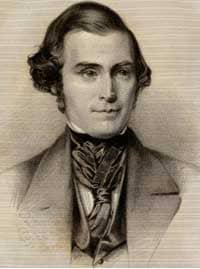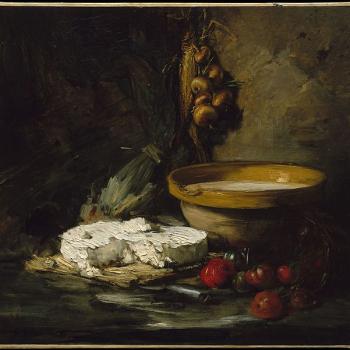I think that ultimately the place with the largest ramifications is our rejection of creation ex nihilo.
Anyway, I wish to turn to a brief discussion of some theological positions of Orson Pratt so as to highlight the possible Trinitarian reading of Mormon theology. Now let me say up front I find Pratt rather naïve in his philosophy here. Further, Brigham Young felt Pratt was extremely wrong. However we tend to reject a lot of Young's own thinking, which was opposed to Pratt's, typically instead following Pratt.
 I don't want to go through all of Orson Pratt's theology. That's far too complex for a post like this and largely beside the point. Rather I wish to address some basics of the Trinity and how one can find them in Orson Pratt's thought, albeit in a rather idiosyncratic form. Also please note that I do not intend to defend Orson Pratt's theology. While he had many interesting ideas ultimately he was very philosophically naïve in his writings.
I don't want to go through all of Orson Pratt's theology. That's far too complex for a post like this and largely beside the point. Rather I wish to address some basics of the Trinity and how one can find them in Orson Pratt's thought, albeit in a rather idiosyncratic form. Also please note that I do not intend to defend Orson Pratt's theology. While he had many interesting ideas ultimately he was very philosophically naïve in his writings.
Let me start by briefly restating the orthodox doctrine of the Trinity. It is the idea of three persons in One God and One God in three persons. The persons are not reducible to one another; that is, they aren't different modes of one individual or person. Further the divine nature is what the three persons share. This divine nature is in some sense a robustness shared by the three that goes beyond merely behaving in a certain way. Now that may be an overly simplified definition but it'll do for now.
Pratt's theology was focused on the idea that there were divine attributes that exist somewhat independently of any person. His ideas were expressed in a form that seems fanciful to us. Pratt felt that what we call the Spirit (as opposed to the personage of the Holy Ghost) was a fluid that filled the universe and interpenetrated all things. Thus this Spirit was in and through all things. Further Pratt saw this fluid as free and in a sense sentient. This Spirit freely had all the attributes of "godness." When any person obeyed the Spirit and reconciled himself to it, he came to have a divine nature and they were One.
Thus the Father, the Son, and the Holy Ghost were all individual persons. Yet they were in harmony with each other and this fluid. This fluid was what enabled them to communicate with all things in the universe and also know all things in the universe. Further there was a unity such that all of them were One.
Now this ends up being the Trinity. Yes, it is cast into a very (to me) fanciful view of materialism, one that I think is demonstrably false. And yes, nearly all Trinitarians reject materialism, so they would reject Orson Pratt's theology. I'd just say that the doctrine of the Trinity proper never addresses whether God's ousia (his substance or nature) is material or not. All the thinkers in Christian history since at least Augustine definitely saw the ousia in more Platonic terms, as an immaterial substance. Further they all would have seen both the Father and the Holy Ghost as immaterial, and would see much more of Jesus as immaterial than Mormons do. But I think those are views due to additional doctrines rather than the Trinity itself.
So if Orson Pratt can be seen to have a theology of the Trinity, should we really say the Trinity is incompatible with Mormonism, especially considering the theological influence of Orson Pratt within the LDS Church?
Clark Goblestudied physics and philosophy at BYU, worked as a computer programmer and now makes award-winning chocolate. A modern renaissance man. His personal blog is Mormon Metaphysics.




